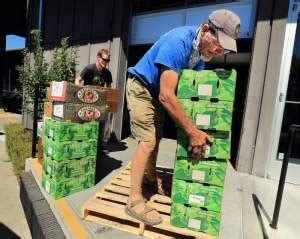
Even before the recent health emergency struck, our food and farming systems were in trouble. Corporate agriculture worldwide created a range of environmental, cultural, and economic crises. Indigenous societies and complex ecosystems fell prey to industrial corporate monoculture, from India to Brazil, Sumatra to Guatemala. Here in the U.S., we have seen the continual loss of the small family farm often growing a diversity of crops, in favor of large corporate operations where the bottom line is profit, not the quality of life for the community and family. The same has happened with our food systems, where small groceries and farm stands must compete with the deep pockets of large grocery chains.
Here in the Valley, we have seen how a rich food-producing region has seen its agricultural economy come to be dominated by viticulture used for alcoholic beverages. Up against this backdrop, our remaining and prospective food producers are left looking for ways to keep and expand local food production. Recent shutdowns of restaurants and other large consumers of local foods have exacerbated this challenge. Supply chains built up to support local food systems and connect large city populations with rural growers are under threat.
This issue has come home to Sonoma Valley, affecting local food distributor FEED Sonoma. FEED, whose lively acronym stands for Farmers Exchange of Earthly Delights, is, in its own words, “A food-hub community of 80+ local farms, supporting ecologically sustainable farming and ranching practices.” Over the past decade, FEED has become the predominant local-food distributor in the North Bay, connecting with 80 farms and food producers with what was a thriving restaurant scene in the region. The shutdowns effectively halted their operations, dropping demand to an estimated 25 percent of where things were only six months ago, threatening the future of the company.
Faced with such prospects, dynamic owner Tim Page looked for ways to keep this essential service in operation. The result is the creation of a local food cooperative, whereby FEED’s suppliers and workers will become shared owners of the company.
In an inspiring call to action, FEED states “These current events are a crisis for our farming community. And yet, together, we have an opportunity: with our farmers at the helm, we have access to a powerful lever of food system change with our farmers, let us wield this lever of truth, strength, and beauty.” Local farmer Paul Wirtz is a grower-member of this effort, working to form the new cooperative and sitting on the founding board. “For our food system to thrive and be resilient we should be working in collaboration,” Wirtz said.
While the structure of this new cooperative is evolving, the opportunities for connecting with local consumers are expanding. Seeing the damaging effects of the shutdowns, FEED moved quickly to establish a food box delivery system. It now has over 800 regular customers for this service, with a local pick up location here in Sonoma at Taub Family Outpost on the Sonoma Plaza. To sign up for this service, or to find out more, see https://shop.feedsonoma.com/
A recent offering is a testament to the great array of local products in the food box, including “peaches and nectarines from Cloverleaf Farm, or ‘sprite delight’ plums, Animalitos Farm ‘ananas’ melon, Paul’s Produce orange ‘nantes’ carrots, Riverdog Farm purple Italian hardneck garlic , ALLSTAR Organics sweet bicolor corn, Paul’s Produce shishito frying peppers, Blue Leg Farms Genovese basil, Paul’s Produce green and red little gem lettuce heads, Earthworker Farm spring salad mix, Russian River Organics french ‘breakfast’ radish.” Um, yes please!
Seth Dolinsky is the Executive Director of the Springs Hall, which works to support “Healthy Farms, Healthy Food, Healthy Community” for all of Sonoma Valley. Its current program “Growing in the Springs” seeks to address this mission in the Springs Community. Springshall.com






Be First to Comment